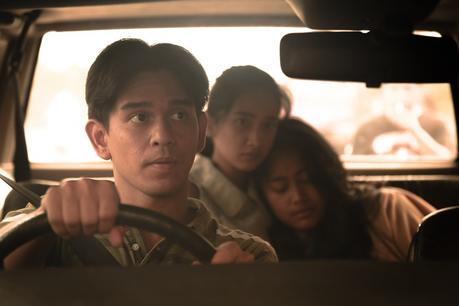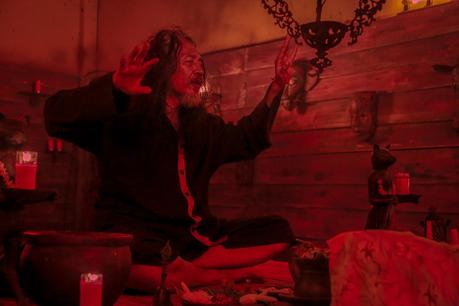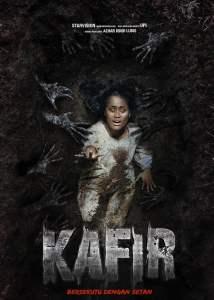Kafir is a well-crafted horror of local occultism culminating in visceral, over-the-top payback.

Review Kafir (2018): After the gruesome death of the father, a family is plagued by mysterious atrocities in amidst of overwhelming grieves and senses of isolation. Simple as it may sound, Kafir (subtitled ' Bersekutu dengan Setan', trans. 'selling one's soul to the devil') is surprisingly delivering an above-average performance among Indonesian new-wave horrors.
In Kafir, the terror comes when the recently widowed Sri (Putri Ayudya, delivering one of the best horror performances in the recent years) begins to believe that an insidious force is preying on her family. Starting off with her husband (Teddy Syah), the malicious energy she allegedly guesses as a result of 'santet'-a form of evil spell in local occultism-gets enraged in endangering her and her two children (Rangga Azof and Nadya Karina). From there, Kafir presents downright (while not consistently) terrors in whatever forms it can have (including in its tackiest form, to be honestly speaking).

Without overly abusing the use of jump-scares and discord, the director Azhar Kinoi Lubis attempts to create a creepy horror which defines its quality from its atmosphere built around the story. Settings and art directions play important part in creating a sense of isolation in aftermath of the father's death. Kinoi Lubis gives 'empty spaces' integral part in isolating the character, especially, Sri as if her husband's demise creating a big, hollow void in the family's own house. Camera often shoots the character in contrast with the hollow background, which later is adorned with dry, sepia colored effect to create a more isolating feels. That hollow space also triggers unsettling feeling as if something might pop out there to cast some terror. Kafir invites us to be in the same room, to feel that hollow space threatening us and that's effective to some extent.
Those hollow spaces become apparent during the first act in Kafir's narrative. While there's no real division of acts, it's apparent that this horror 'over-utilizes' its three-act structure to characterize each act with three different approach which roll simultaneously as the story progresses. First act takes its time to unravel the grief-stricken family's struggle to cope from the loss. Upi's script makes this part works on psychological level, as if the terror Sri begins to experience is some kind of side-effect of the grief. When carefully presented, Kafir has always been at its finest form with this presentation. Apparently, the first act becomes the film's most important part since many clues and build-ups are carefully presented here to be finally revealed by the beginning of the third act.
Second act delves deeper into local occultism as indicated in its title. Influenced by the ambiguity of the first act, Kafir finally unravels some explanation to why the title is 'Kafir' (trans. Heathens) as it introduces a shaman, Jarwo (terrifyingly portrayed by Sujiwo Tejo), whose existence also unravels a glimpse of Sri's background-which hasn't been nudged up to this point. While the mystery has gotten thickened here, the highlight of the second act is the diabolical imagery which stays longer than the story itself. Sujiwo Tejo's character has always been the most interesting character here. Jarwo's existence in the story provokes thoughtful insight, which can be interesting to discuss (although the movie opts out to this); at the same time, it also draws connections to a previous Kafir movie (of a different story and nature) released in 2002.

By the second act, Kafir has made an interesting horror-mystery combining supernatural horror, psychological thriller and the foundation of whodunit. The story climaxes with a carefully prepared (although not unpredictable) twist, which should've thrown a sucker punch to the audiences. However, a carefully built twist doesn't always mean a good twist.
Kafir's twist provides a point but, at the same time, is faltering. It unravels the movie's campy third act which combines over-the-top acting with visceral brutality, which is quite satisfying. Even so, the third act feels a little detached from the whole film despite it provides a kitschy closure to Kafir.
Final verdict, Kafir is a well-crafted horror which enticingly uses local occultism to deliver atmospheric terror cultimating in visceral, over-the-top payback-quite faltering but, nonetheless, creepy.
Kafir: Bersekutu dengan Setan (2018)
Horror Directed by: Azhar Kinoi Lubis Written by: Upi Avianto Starred by: Putri Ayudya, Rangga Azof, Nadya Karina, Indah Permatasari Runtime: 97 mins
IMDb
